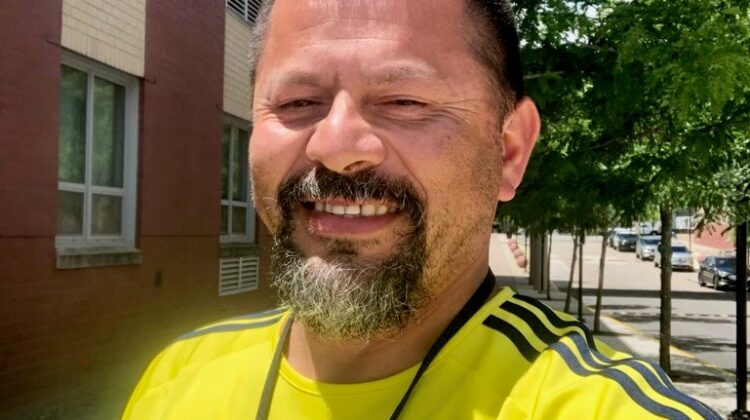If you’ve attended a Marblehead High sporting event, there’s a good chance you’ve seen Elmer Magaña there, clapping his hands with a smile.
Magaña was born in El Salvador and is the current boys soccer coach with the Magicians. Plus, he’s a big supporter of the Northeastern Conference.
He’s also a Spanish teacher at the school. He’s been there since 2006 and has been coaching soccer since 2010. As if you needed more, he’s also the first Latino coach of Marblehead’s boys soccer team.
“When I got [to Marblehead] in 2006, the athletic director wanted me to coach right away, but I wanted to get comfortable with the area and the district. I asked them if he could give me three years and I’ll do it,” Magaña said. “In the third year, he remembered what we discussed and he reminded me – and I said I’ll do it. I started coaching the JV and I did that for about 10 years. In 2020, I stepped in as the varsity coach.”
Since he started coaching, Magaña has been known as a big supporter of the NEC. From his #NECPride hashtag on X, formerly known as Twitter, to being in the crowd during state tournament games, he’s made it a mission to support the Magicians – in addition to conference rivals.
“I think it sets a good example for our athletes if they see other coaches in the conference getting along and supporting each other. They know that they can get along, too, and support each other,” Magaña said. “For example, the soccer coach at Gloucester (Armando Marnoto) is my brother-in-law. When it comes to the game, we’re rivals, but once the final whistle blows, we salute and hug each other, then say, ‘great game.’ That’s what you want to see in every game.”
In addition to supporting other coaches, Magaña believes it’s in everyone’s best interest to root for each other, to have the MIAA view the NEC as a strong conference.
“When the new state tournament format came out with the rankings, I figured, it’s our conference versus the other conferences in the state. The more we support each other, the better it will be for the conference,” Magaña said. “During the tournament, the further North Shore teams go, the more respect it gives to our area.”
Between supporting teams and trying to make the NEC one of the strongest conferences in the state, Magaña also tries to spread love whenever he can.
“Supporting each other is a great way to spread kindness. The political climate in our country or the other tragedies happening around the world, spreading a little bit of love and kindness goes a long way,” Magaña said. “If you can paint a smile on someone’s face, you make their day even if it’s just for a minute. It doesn’t hurt.”
During the summer, as he counts down the days until preseason, Magaña works for the Salem State Upward Bound Academic Program – something that has a significant impact on him.
“I’ve been teaching for the Salem State Upward Bound Academic Program for 21 years. We bring students from Lawrence High School to Salem State and give them the college experience,” Magaña said. “We teach them around four classes a day. We want to inspire them to finish high school and go to college. It’s very rewarding and I love doing it.”
“I’m a Latino myself and most of the students there are Latinos like Dominican and Puerto Rican descendants. We have some Asian descendants, too. It’s rewarding because a lot of them are first-time graduates from high school, and to go to college is a big deal. Most of them are low-income, so I feel like I’m giving back to the community,” Magaña said. “When I would go to school in Los Angeles, we had like 5,000 kids. I had some teachers who also helped me out and that’s what I’m trying to do with these kids.”
Helping students and showing support is something Magaña is passionate about, and something he says he will continue doing.
“I like to show support to our student-athletes. A lot of them are students in my classroom and they really appreciate seeing me attend the matches. I also enjoy it because I love sports. I’m a soccer coach, but I like supporting the other sports as well – in addition to the other coaches,” Magaña said. “I think it’s important for the athletes to see teachers outside of the classroom.”

